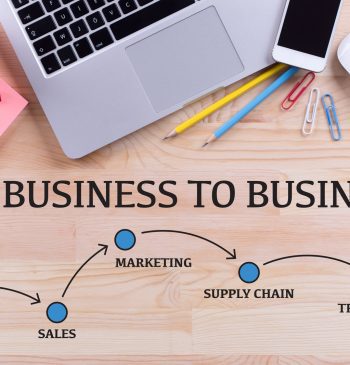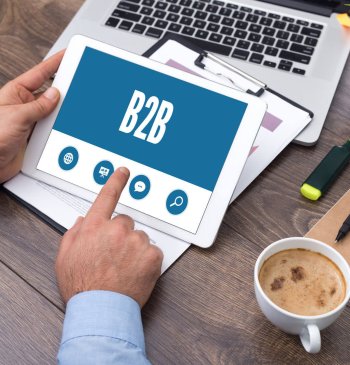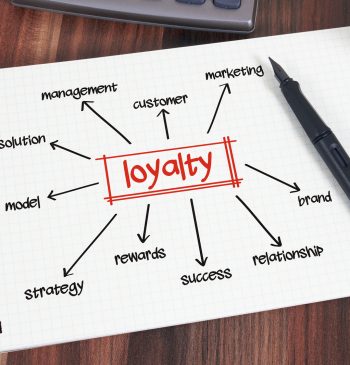13 Oct

The retail industry has long existed. The simplest transaction or exchange of goods could be retail in the old times. However, today, retail is a far more sophisticated landscape. As much as it implies a B2C approach more than the B2B, we cannot exclude the B2B dynamics from this complex domain. Understanding this more and more over time, especially in an era influenced by technology, retail experts have added metrics to read the business better.
Interestingly, these metrics resemble those of the B2B loyalty subject. This notion proves we can only interpret the retail sector heavily defined by B2C dynamics with the B2B dimension. This brings us to the importance of discovering B2B loyalty program, which are foundations for generating relevant insights for B2B customer loyalty programs in retail.
Retail from the B2B Perspective
What is retail? What retail parameters overlap with the necessities that brought about the B2B loyalty programs in retail? The Cambridge Dictionary defines “retail” as an economy of businesses selling goods to the public through online stores. Retail is heavily about B2C transactions. Most of this comes from the fact that retail relies majorly on wholesale. Wholesale-level sales are generally B2B. However, today, companies selling businesses can also sell directly to individuals.
Key Distinctions between B2B and B2C Loyalty
To understand these differences, it is better first to examine the distinctions between B2B and B2C marketing basics. B2B marketing is marketing for products and services to other businesses. On the other hand, B2C marketing strategies are more aimed at individual customers. This key difference causes us to adopt a straightforward tone when constructing a B2B marketing strategy. We focus on the information exchange the most when doing so. This is because most B2B purchase decisions are made based on fulfilling the simple and rigid criteria: being compatible with the budget and goals. On the individual purchase level, this is rarely the focus.
In addition, emotional and cognitive reasons impact an individual customer’s purchase decisions. We should not ignore that this notion also applies to the B2B context. This is why B2B loyalty, therefore the B2B loyalty programs in retail, is necessary.
What are Loyalty Programs in Retail?
Loyalty programs in retail have emerged as a key strategy for fostering long-term customer relationships. These programs are structured marketing strategies designed by retailers to encourage customers to continue shopping at their stores or using their services. At their core, loyalty programs reward customers for their repeated business. This is often done through a points system, where each purchase earns points that can be redeemed for discounts, products, or other perks. Some programs also offer tiered membership levels, where higher spending leads to more exclusive rewards.
The beauty of loyalty programs lies in their mutual benefit. Customers enjoy rewards and a sense of being valued, while retailers benefit from increased customer retention and valuable insights into shopping behaviors. This data can be crucial for tailoring marketing strategies and improving customer experience. Moreover, these programs often leverage digital technology, making it easy for customers to track their points and rewards through mobile apps or online portals. This convenience adds to the appeal, encouraging further engagement.
Benefits of Customer Loyalty Programs in Retail
Customer loyalty programs in retail are a strategic asset, offering many benefits that enrich the customer experience and drive business growth. Here are the key advantages:
- Personalized Shopping Experience: These programs allow retailers to track and analyze customer purchases and preferences, enabling them to offer tailored products and communication. This leads to greater customer satisfaction and encourages repeat business.
- Valuable Data Insights: Loyalty programs provide critical purchasing patterns data, helping retailers better understand customer behavior. This information is invaluable for effective inventory management, targeted marketing, and enhancing product offerings.
- Increased Customer Spending: Customers enrolled in loyalty programs tend to spend more, choosing participating retailers over competitors. This results in higher average sales per visit.
- Cost-Effective Customer Retention: Retaining existing customers through loyalty programs is generally more cost-effective than acquiring new ones. These programs encourage customers to continue shopping with the brand.
- Enhanced Brand Reputation: Satisfied customers will likely recommend the brand to others, aiding in customer base expansion through word-of-mouth. This boosts the brand’s reputation and market presence.
Overall, implementing customer loyalty programs in retail is a strategic move that fosters customer loyalty, drives sales, and strengthens the brand.
How Can Retailers Build Customer Loyalty Programs?
Retailers design customer loyalty programs to foster repeat business and build long-lasting customer relationships. These programs are strategically developed to offer rewards, discounts, or exclusive perks, encouraging customers to continue shopping with the brand. The core of a successful loyalty program lies in understanding customer needs and preferences. Retailers often use data analytics to track buying patterns and tailor rewards accordingly. For instance, a customer frequently purchasing pet products might receive special pet food or accessories offers.
One popular approach is a points-based system, where customers earn points for every purchase. These points can be redeemed for discounts, products, or other benefits. This incentivizes repeat purchases and creates a sense of achievement as customers accumulate points. Personalization is another key aspect. Retailers may send personalized emails or app notifications about exclusive deals aligning with the customer’s past purchases or interests. This makes the customer feel valued and understood.
Simplicity and accessibility are important, too. Loyalty programs in retail should be easy to join and use, with clear instructions and visible rewards. This enhances the customer experience and increases the likelihood of program participation. Finally, consistent communication and appreciation, like thanking customers for their loyalty, contribute significantly to building a loyal customer base. Through these thoughtfully designed loyalty programs in retail, retailers boost sales and create a community of loyal and satisfied customers.
A Common Pitfall
When constructing your B2B loyalty programs in retail, we usually aim our efforts at the parties or individuals who can influence buying decisions. Since B2B is the commercial activity between two businesses, unlike B2C, we tend to think the opposite party we deal with is solely a constitution.
However, who you are reaching is still actual people within companies. In today’s business world, buying activities may result from group decisions since more stakeholders are in question. This implies a complex and hard-to-comprehend business landscape, but thanks to today’s data-driven technologies, we have a strong tool at hand. How does data become helpful? From channel management software to B2B loyalty programs, we no longer have to feel overwhelmed or confused.
Data to Serve Your B2B Loyalty Objectives
With advanced platforms like Apex Loyalty, you can derive accurate, timely, and meaningful data. The more powerful the data becomes, thanks to agile technological structures, the more relevant your approach to buyers becomes. What does relevance mean here? It defines the personalized information and offers that can be distributed to the other businesses in your B2B channel.
Map Out Your Retail Strategy with Apex Loyalty
Apex Loyalty is a cloud-based B2B loyalty, engagement, and sales incentives automation platform. It is great not only because of its novel technological structure but also due to the mindset of its developers. The team behind Apex Loyalty comes from various sectors. Apex Loyalty results from years-long diverse experience blended with the know-how of today’s eCommerce.
By adopting customer loyalty programs in retail, you can stay connected with purchasing departments, channel partners, distributors, and resellers to drive more sales. In this respect, Apex Loyalty’s power comes from its dynamic rules engine and flexibility, making it a fit for various industries.
You can read our previous post on https://www.apexloyalty.com/how-to-work-your-loyalty-program-during-covid-19/







